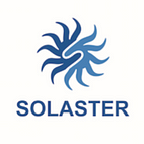Solaster & GoChain collaborate to set universal health data standard for blockchain
Solaster, a leading healthcare focused blockchain company is developing the world’s first interoperability health data standard for Dapps and smart contracts. Solaster has partnered with GoChain, a 100% Ethereum-compatible blockchain on the initiative.
The standard (GO-70) will be ratified by GoChain, which is a scalable enterprise-ready blockchain and smart contract platform. However, because GoChain is Ethereum compliant, smart contracts on the Ethereum network can also utilize the standard to achieve easy interoperability with other smart contracts. Distributed applications (Dapps) that leverage the GO-70 standard on GoChain will enjoy seamless integration with each other, solving the application interoperability problem for healthcare.
“Solaster is excited to partner with GoChain for numerous reasons,” said Solaster Co-Founder and CEO Stuart Lackey. “First and foremost, GoChain’s core team believes in the utility of blockchain technology to significantly impact the future of healthcare and a standard interoperable data language is big part of that. We are very aligned on that fundamentally.”
The GO-70 standard will initially be inspired by FHIR, the Fast Healthcare Interoperability Resources standard created by Health Level Seven International (HL7), a not-for-profit, ANSI-accredited standards developing organization dedicated to providing a comprehensive framework and related standards for the exchange, integration, sharing, and retrieval of electronic health information that supports clinical practice and the management, delivery and evaluation of health services. Due to the years of work that have been poured into FHIR, Solaster believes it is the right place to start with an interoperability language for smart contracts.
The FHIR specification is broad and covers many of the resources that would be contemplated in a healthcare interaction. Solaster’s token will initially focus on FHIR resources that empower the patient to capture and unify their health data. The GO-70 standard however will expand to a full expression of the FHIR resources, and may expand beyond them as use cases emerge.
Solaster will be the first ICO launched on GoChain and the Soalster Smart Token (SST) will be the first token to support the new GO-70 interoperability standard.
“GoChain is extremely proud to partner with Solaster as the first ICO on our platform,” said CoChain CEO Jason Dekker. “Solaster’s groundbreaking mission to create an interoperable health data standard is long over due and we are tremendously happy to be a part of it.”
From a tech perspective, GoChain features the required speed necessary for real world applications. In the future the Ethereum network may solve the issues it has around transaction speed and scaling, but today the GoChain production network processes transactions at 100 times the speed of the Ethereum network and its team is working to significantly increase that throughput. Additionally, GoChain’s Proof of Reputation consensus mechanism creates absolute transparency around the nodes that are responsible for producing blocks and coming to consensus on the network.
As Solaster builds out the GO-70 standard, it is concurrently identifying and investing in best-in-class Dapp projects to be placed on a new health specific platform, which will utilize GO-70 along with Solaster’s SDK. Because transaction fees on GoChain are 7500 times less expensive than those on Ethereum, it is a much more economically viable and attractive for health Dapp developers.
If Solaster and GoChain are able to achieve their vision in gaining widespread adoption of a universal healthcare data standard it should result in dozens of new projects initiated on the platform utilizing Solaster’s SST, as well as, create a global launching pad and community for best-in-class decentralized health applications.
Resources: solaster.io gochain.io
